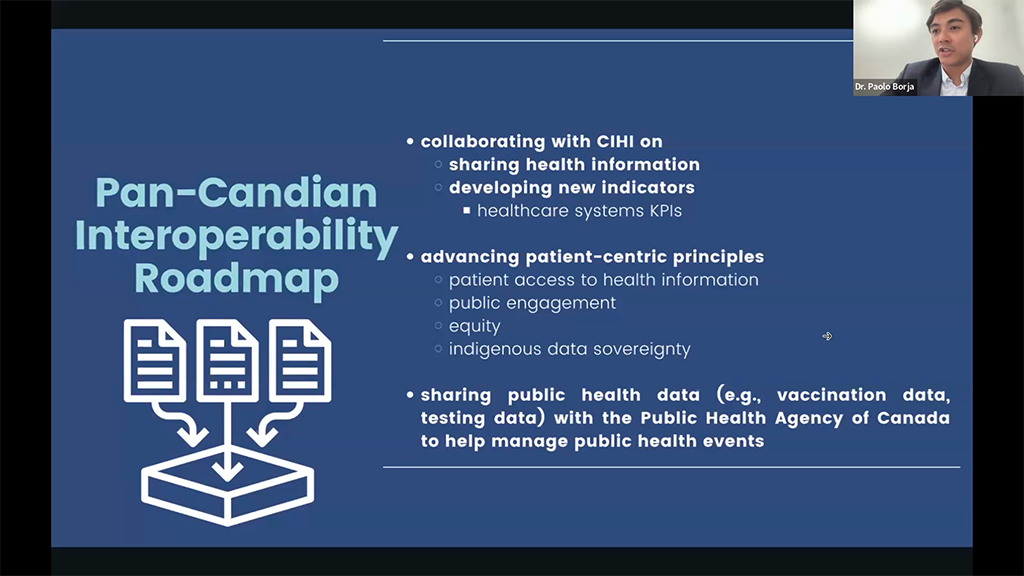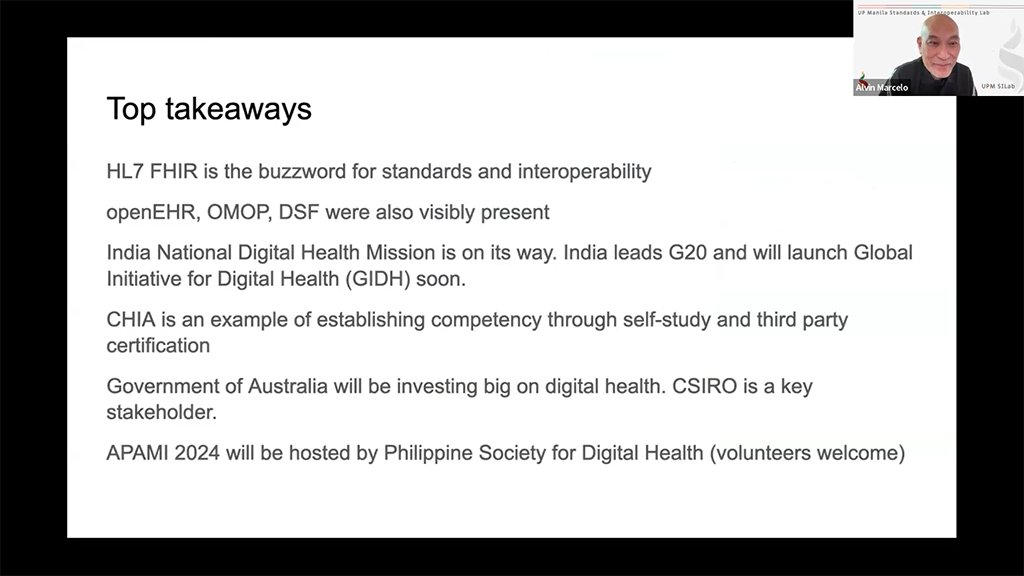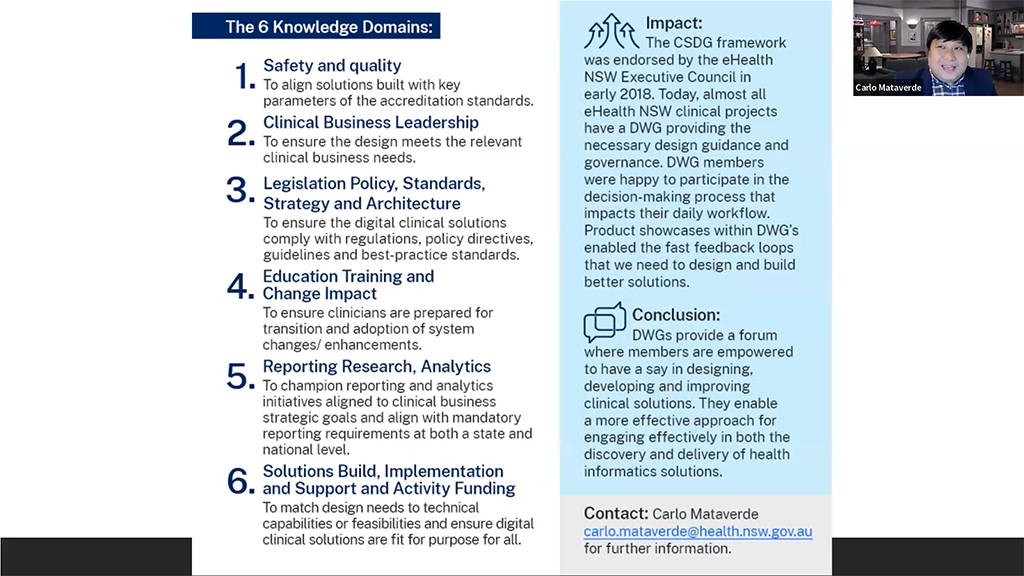Bridging the digital divide towards health for all
News and Events
Overview of the Health Sector Enterprise Architecture
28 April 2022 | The Health Enterprise Architecture (HEA) in the Philippines has been operational since 2005. HEA is an important enabler for the interdisciplinary collaboration of various stakeholders within the health sector. With the implementation of Universal Health Care (UHC) in the Philippines in 2019, the Department of Health reviewed the HEA to ensure that all components and processes are in place and adhere to health standards. Ms. Cherrie Esteban from the DOH Knowledge Management and Information Technology Services (KMITS) discussed the overview of HEA and how it will improve the development of UHC. Mr Francis Uy was the moderator.
You may access the meeting recording here:
Health informatics experts share emerging global innovations in their field
Last August 19, The Philippine Society for Digital Health, together with the Asia eHealth Information Network (AeHIN), held a webinar on the Emerging Trends in Global Health Informatics.
The online discussions were led by resource persons based in the Philippines, Canada, and Australia. A wide range of participants also joined last Saturday, which include clinicians, professors, and students.
Lessons from the speakers
The first presenter, Dr. Paolo Miguel Borja, shared his experience attending the E-Health Conference & Trade Show in Toronto earlier this year.
Dr. Borja finished his studies in the Philippines and served lead roles at the Asian Hospital and Medical Center in Manila. Now, he is taking his postgraduate studies on Health Informatics (HI) from the George Brown College in Toronto, Canada.

“Canada’s digital health space is actually taking crucial steps towards improving healthcare information- that’s for both healthcare systems and patients alike. Their government is also committed to achieving a more connected healthcare system, [promoting common standards and interoperability,” said Dr. Borja.
Dr. Alvin Marcelo, director of AeHIN and the University of the Philippines Manila Standards and Interoperability Lab (UPM SILab), talked about his experience attending MedInfo23. MedInfo23 was a five-day conference held last July that brought together digital health practitioners from all around the world.

“The technologies for [healthcare systems] interoperability are already here. What’s missing is the “people interoperability” or the coming together of people to agree to exchange data securely and for specific purposes,” said Dr. Marcelo.
The last speaker was Dr. Carlo Mataverde, a Health Informatician for eHealth New South Wales (eHealth NSW). EHealth NSW is a company based in Sydney, Australia, that harnesses digital technology to provide quality care to patients.
“[In crafting better clinical solutions,] we make sure we involve humans in whatever we design. [Our services include] design governance, digital health analysis and guidance, and translation between healthcare and IT,” said Dr. Mataverde.

“[In doing so,] we go through a six-point knowledge domain checklist to ensure that [our designs are beneficial and inclusive] to everyone in the room because [given the many perspectives during the design process], not any one person knows about all this,” added Dr. Mataverde.
Localizing global HI trends
With regards to transforming the Philippines’ health space to match that of other countries, the speakers have some insights to partake.
“To implement these [rising health informatics] trends locally, the Philippines would need to invest in digital infrastructure, promote interoperability among healthcare systems, and develop relevant regulations and policies. Collaborating with experienced countries and organizations can provide valuable insights and guidance,” said Dr. Borja.
“The most important aspect of any change is the people. Without people dedicating their career to help advance informatics, it will be extremely challenging to advance digital health,” said Dr. Mataverde.
Indeed, much is yet to be done to bolster the health technology available to Philippine clinicians and patients. But informative webinars like that of PSDH brings the local healthcare system closer to its international counterparts.
This initiative is part of the PSDH’s advocacy in promoting the Health Data Governance Principles with support from Transform Health. These principles aim to incorporate a human rights and equity lens in data usage across health systems.
“[A robust health informatics field] would increase the establishment of secure and ethical electronic patient records that promote patient safety and population health,” added. Dr. Marcelo.
Interested parties who want to access the recording of the webinar can do so via this link. For news and updates about similar educational activities, visit PSDH’s official website or join its Viber community channel.
Integrating Data Governance Principles into Philippine Health Education
15 October 2022 | Integrating Data Governance Principles into Philippine Health Education
The academe plays a significant role on advancing health data governance principles within the education system yet it remains unknown and exclusive to medical institutions. In this forum, educators Dr. Maria Minerva P. Calimag and Dr. Sarah Salazar, and students Mr. Qjiel Mariano and Mr. Arniel Gilo together with Mr. Nelson Tiongson as moderator discussed the roles of academic institutions, challenges, and strategies in incorporating health data governance within the education system.
You may access the recording here:
A Patient Engagement Framework for Doctors and Hospitals
7 July 2022 |A Patient Engagement Framework for Doctors and Hospitals
To strengthen the national health system, patient engagement is essential in promoting each patient’s capability to actively choose or participate within these systems. This implies compliance to policies and regulations of institutions and building partnership with health professionals. The Patient Engagement Framework deals with the patient journey based on their level of engagement through respective focus and activity. Chief Information Officer of the Metro Pacific Health Tech (mWell) Dr. Michael Muin tackled each part of the framework for the use of healthcare providers and the role of digital health.
You may access the recording here:


